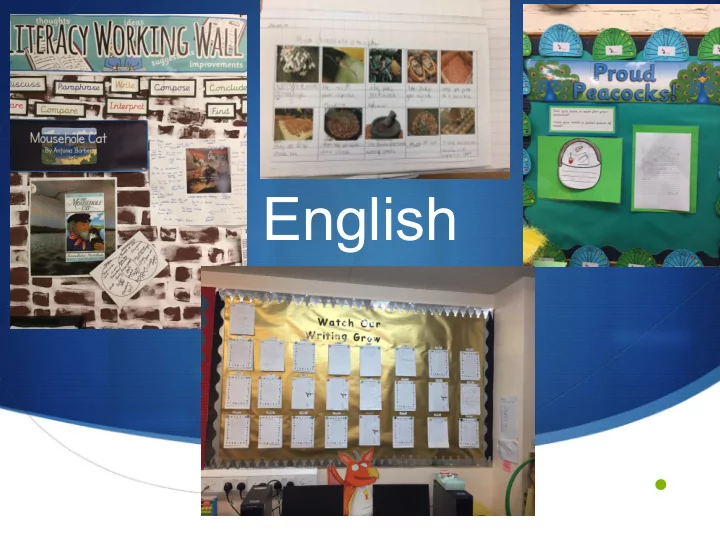

English •
Aims • Share the different elements of the English Curriculum. • Impact in the classroom • Discuss how each aspect is taught across the Federation • Discuss how the English curriculum is delivered at each key stage. • Explanation of the importance of reading and spelling • Overview of Assessments.
Changes There is a much higher focus in the new curriculum on the teaching of phonics, grammar and transcription. Expectations have been raised within the new curriculum. Children are expected to master, use and apply their skills in a range of contexts. The biggest change is that there are no levels within the new curriculum with children working towards age related expectations.
Reading • Word Reading • Comprehension Writing • Composition • Transcription (spelling and handwriting) • Grammar Communication • Speaking and Listening • Performing English across the curriculum • Reading, Writing and Communicating for a real purpose.
Reading • Phonics-Letters and Sounds (Reception, Year 1 and intervention) • Shared Reading (whole class reading) • Reading skills (the individual reading skills are taught including comprehension) • Individual reading (with parents and additional support in school for those who need it) • Reading for pleasure (individual reading of books of own choice) • Reading across the curriculum/for a real purpose.
Quality Texts Quality texts evoke an emotional response from the reader. How... • language choices - thoughtful, powerful, selective • memorable characters • setting - breathtaking, familiar, imaginative • compelling plot • pace - mood - tension • design - layout • illustrations - mind expanding - do not underestimate! Picture books are not just for children!
Reading at Home Reading with your child is vital. ■ Research shows that it‛s the single most important thing you can do to help your child‛s education. ■ You are the child's first and most important teacher. ■ Model reading as the norm in your home – let your child see his parents / siblings etc. reading for enjoyment as well as purpose. ■ Think of ways to make reading fun.
Helping at Home Reading requires two skills: Phonics and Word Recognition The ability to recognise words presented in and out of context. The ability to blend letter sounds (phonemes) together to read words. Understanding The ability to understand the meaning of the words and sentences in a text. The ability to understand the ideas, information and themes in a text. If a child understands what they hear, they will understand the same information when they read.
Introduce your children to different types of books; classic fiction, chapter books, short stories, joke books, poetry, non-fiction. ■ Read them the book that was your favourite when you were a child. ■ Read slowly, with expression. Try to use different and funny voices for characters. ■ Follow the words and read the story using the pictures. ■ Talk about what is happening and what might happen next. Leave the story on a cliffhanger!
Writing Phonics- (Reception, Year 1 and intervention) • Guided Writing (in smaller groups) • Individual writing • Writing across the curriculum/for a real purpose • Spelling • Punctuation and Grammar taught through Literacy lessons •
Progression Key Stage 1 (Years 1 and 2) • Phonics lessons for most children in year 1 and into year 2 • Phonics screening test (usually in June). Year 1 pupils and those in year 2 who did not meet the required standard in year 1. • Extended writing lessons. • Literacy Skills • Reading Skills • Individual reading • Reading, writing and communication across the curriculum and for a real purpose • Discrete handwriting sessions. • Termly assessments
KS2 Key Stage 2 (Years 3-6) • Daily Literacy skills sessions- both reading skills, SPaG and discrete handwriting sessions • Individual readers • Reading, writing and communication across the curriculum and for a real purpose. • End of Key stage SATs tests for Reading and SPaG (Spelling, Punctuation and Grammar). • Writing is assessed by class teachers and moderated separately • Feedback, developmental marking • Learning labels- differentiated steps to success
Grammatical Terminology Year 1 word, sentence, letter, singular, plural Year 2 verb, tense (past, present), adjective, noun, suffix Years 3 word family, conjunction, adverb, preposition, direct speech, prefix, consonant, vowel, clause, subordinate clause Year 4 pronoun, possessive pronoun, adverbial Year 5 relative clause, modal verb, relative pronoun, parenthesis, determiner, cohesion, ambiguity Year 6 active and passive voice, subject and object, synonym
Spelling Test accelerator immacolete propeler rasberry sherriff sieve gaurdian effervescent perspiration necessary because begining tonsilitis libary cuboard peeple misspell modelled innocuous wierd seperate surprizing leisure center Which are correct? How could you help someone learn to spell the others? What words are commonly misspelled within our school? What words do you often have to think about?
All Correct? accelerator immaculate propeller raspberry sheriff sieve guardian effervescent perspiration necessary because beginning tonsillitis library cupboard people misspell modelled innocuous weird separate surprising leisure centre
Spice Up Spelling
Assessment Statutory: KS2 SATS - reading, writing and SPAG Year 1 phonics www.gov.uk KS1 - SATs - including optional SPAG
Thank You! I hope you found the information useful. Please complete the feedback form as we would really welcome your comments so it can inform future sessions. Do you have any questions?
Recommend
More recommend